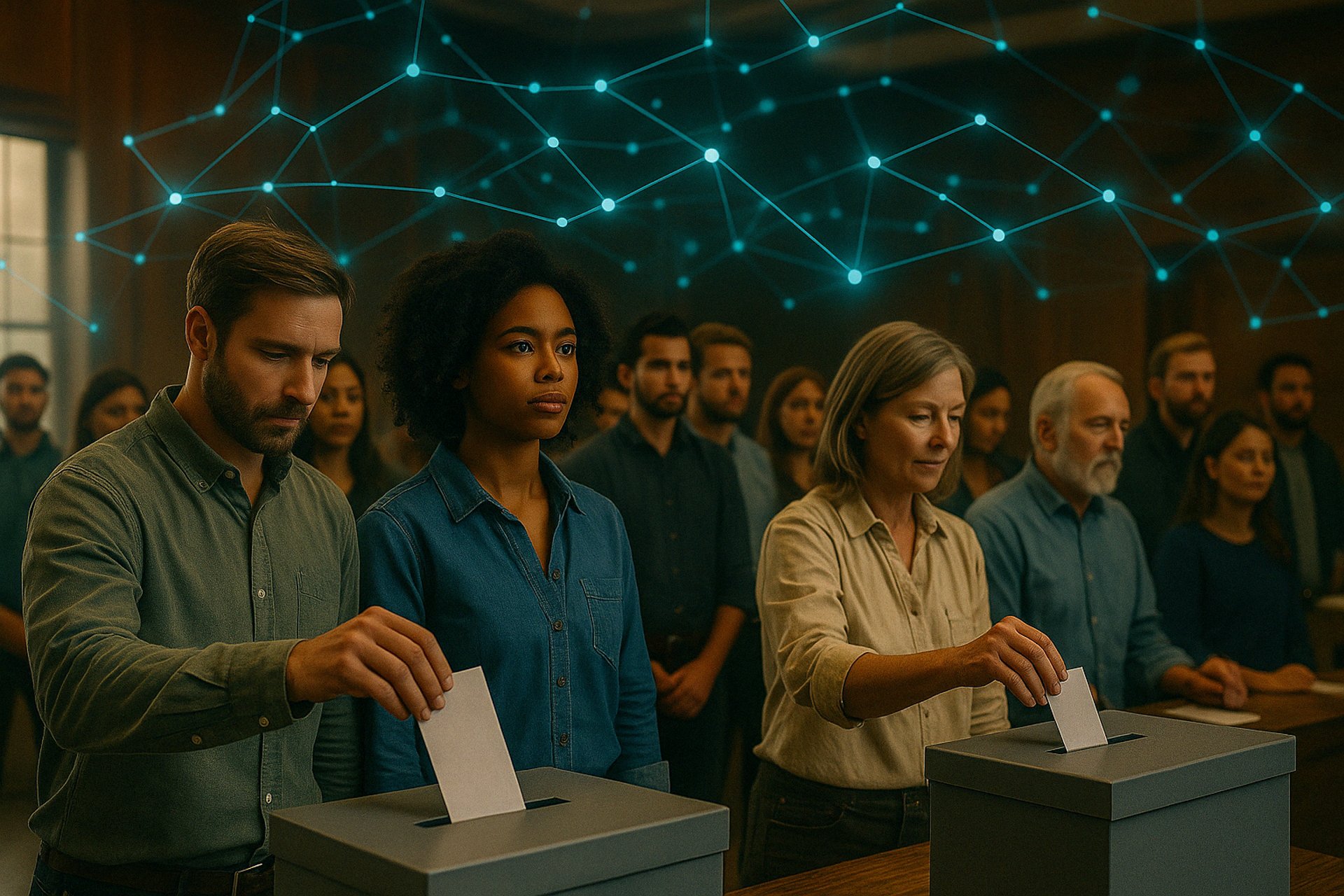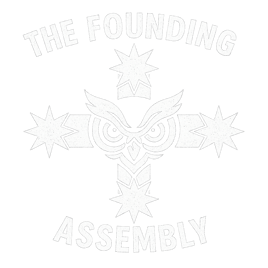
Stage Five
Lawfully replace the current political system.
“Sovereignty Begins with Us.”
The Sovereign Transition
A ballot box labeled “VOTE” symbolizes the successful referendum that ushered in our new Constitution. Stage 5 of The Founding Assembly’s plan - the Sovereign Transition, is now underway. Thanks to an overwhelming Yes vote from Australians in Stage 4’s national referendum, our nation has officially turned a new page. This stage is about confidently and smoothly shifting into the people written system of government we’ve chosen. Below, we outline what’s happening now and what the future of our democracy feels like in this new era.
Where We Stand After the Referendum. At this point, we can confidently say that several historic changes are in motion:
Referendum Success: A nationwide referendum under Section 128 of the Constitution has successfully passed, with Australians voting to adopt the new charter. In other words, “the approval of the people” has been obtained through lawful, democratic means.
New Constitution Written by the People: The old 1901 Australian Constitution has been peacefully and lawfully replaced with a new Constitution drafted by the people themselves. Our founding legal document is now one authored by citizens, not politicians, reflecting the will of today’s Australians.
Key Reforms Enacted: The new Constitution has brought significant reforms into effect. For example, the era of party politics in our federal Parliament is over, political parties no longer hold sway under the new rules. The office of the Governor-General (the Queen’s representative) has been removed, reflecting our shift to full sovereignty of the people. In place of the old structures, new representative bodies and processes are being established that put community voices at the center of decision-making.
Preparing for New Elections: Australians are now selecting or preparing to select new representatives under this new system. We’re on the cusp of our first Parliament convened under the people’s Constitution. Candidates are emerging from local communities – likely independents endorsed by their neighbours, since there are no party machines anymore. This will be the first national election where Australians choose individuals they trust, rather than voting along party lines.
Transitional Arrangements: A short transitional period is underway to bring these new systems online. During this transition, interim measures ensure that government services and day-to-day administration continue without interruption. The existing institutions are dutifully implementing the changes mandated by the new Constitution. Essentially, we are carefully retooling our democracy’s engine while keeping the car running, so that everything is ready for the new era of governance.
Renewal, Not Disruption
Despite the significance of these changes, it’s important to remember that daily life remains stable and calm. You still go to work or school, pay your bills, and enjoy your weekends just as before. Australia isn’t in chaos, far from it. In fact, the only things changing are the structures we, as citizens, have chosen to change. Our regular routines and the rule of law persist as normal; the difference is in how decisions are made and who gets to make them. Think of this stage as a national renewal. We have updated our governance, but we haven’t upended society. Government offices are open, the courts are functioning, and laws (old and new) are being upheld. The public services and institutions that keep our communities running haven’t skipped a beat. The transition is orderly and methodical: we’re implementing the people’s decisions step by step, ensuring continuity at every turn. This is not a disruption or a revolution in the chaotic sense, it’s a peaceful handover of sovereign power back to the people, exactly as planned. What does change visibly is how we govern ourselves. Because we decided these changes together, we can move forward with confidence. There’s a shared understanding that this is our collective project. Rather than feeling uncertain, Australians can feel empowered knowing that the system now in place is one we built through informed choice. Day-to-day life goes on, but with the reassuring knowledge that our democracy has been renewed on our terms.
Envisioning Our New Era of Democracy
With the Sovereign Transition in progress, let’s take a moment to imagine the new era we are entering. What might governance look and feel like under our people-written Constitution? Below are a few scenarios to help envision how things will work in practice: Imagine laws starting as citizen ideas. Under the new system, laws are drafted from citizen petitions. For example, a group of concerned parents might propose an improvement to local education policy. They gather enough signatures from fellow citizens, and this grassroots petition automatically triggers the drafting of a bill. Instead of ideas getting lost in bureaucratic pipelines, community initiatives now go straight onto the state agenda. In Parliament, this citizen led, representative drafted bill is formally introduced and must be considered. Your ideas, if they earn enough public support, can directly become proposed laws. This means the legislative process begins from the people up, not from politicians down, making our laws truly reflect community needs. Imagine representatives chosen by community, not party. When you turn on the news to watch parliamentary debates, you no longer see opposing party blocs trading barbs. Instead, you see independent representatives sitting as equals, each one chosen by their local community without party preselection. Perhaps your town’s representative is a local teacher or doctor, someone you personally know and respect. They earned their place by working with neighbors and community groups, not by climbing party ranks. In debates, these representatives aren’t toeing a party line (because there are no parties); they’re voicing the actual concerns of the constituents who chose them. This change is tangible every time government meets: the atmosphere is about problem solving and collaboration, since no one is trying to score points for a political team. You can take pride in knowing your MP is truly your community’s voice, accountable directly to you and your fellow voters, not to any party boss. Imagine transparency at every layer of government. In this new era, transparency is baked into every layer of governance. Important meetings are open to the public eye, government data and budgets are published in accessible formats, and decisions are made in the sunlight of scrutiny. For instance, when that education bill from the citizens’ petition is being debated, you can live stream the committee discussions from home. All the amendments, expert advice, and even the funding allocations tied to the bill are transparent. There are no hidden deals in back rooms, the new Constitution requires that the people can observe and audit governmental workings. You might visit an online portal to see exactly how every representative voted on an issue, or to track how public funds are being spent, down to the dollar. This level of openness builds trust: you don’t have to wonder what’s happening behind closed doors. In our renewed democracy, if it’s your government, you get to see it. Knowledge is power, and every citizen now has the means to stay informed and involved. Imagine year-round civic engagement. Perhaps one of the most exciting changes is that voting and civic engagement can happen year-round, not just every few years. In practical terms, this means you aren’t limited to having a say only on election day. With the new structures, there may be regular community referendums, citizen assemblies, or online polls on key issues throughout the year. For example, if a major policy decision arises say, how to allocate a community budget surplus, you might receive an official invitation to vote on that specific question, irrespective of any election cycle. Citizens can log into a secure civic platform to weigh in on issues in real time. Our democratic participation becomes an ongoing conversation rather than a rare event. Imagine discussing a local environmental proposal with your neighbors in April, voting on it in May, seeing it implemented by July, and then holding a community review in December. Democracy has become a continuous, living process. This year round engagement means that government is not a “set and forget” deal, it’s something we shape actively, whenever our input is needed. In this future, being a citizen is a bit like being a member of a giant cooperative: you contribute your voice regularly to guide the course of the nation. It’s more work than voting once every few years, yes, but it also means far greater influence over the decisions that affect us. And because we all share in that responsibility, our society becomes more cooperative and responsive overall.
The People Hold the Pen
Through each step, Australians can prove that profound change can occur without violence, without chaos, and without coercion. Instead of anger or division, we can chose discussion, ballots, and mutual respect to bring about this transformation. This results in a nation reborn by our own hands, a testament to what informed, determined citizens can achieve together. As we complete the Sovereign Transition, sovereignty will truly resides with the people of Australia. Our new Constitution begins with “We, the people…” and we will live up to those words. We have a chance to take authority not for its own sake, but to remake our governance in service of the public good. Every institution, from Parliament to the local council will draw its legitimacy and direction from the collective will of Australians. Most importantly, the people will hold the pen. Our nation would be governed by the collective will of informed citizens, through peaceful, lawful means. We can write the next chapters of Australia’s story, together. What comes next will be decided not by a privileged few, but by all of us, openly and fairly. This is our democracy, renewed and secured by our own conviction. With pen in hand, we can move forward united, empowered, and ready to build our own future.
